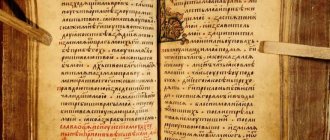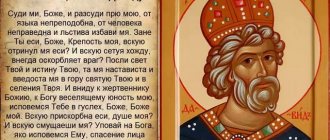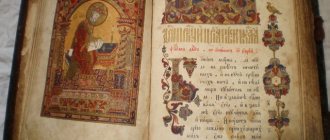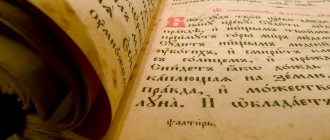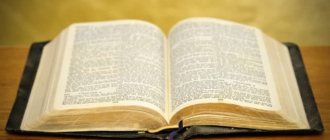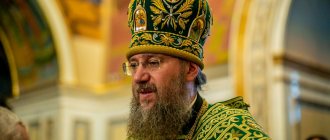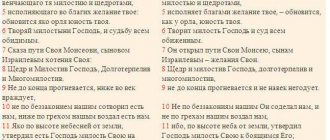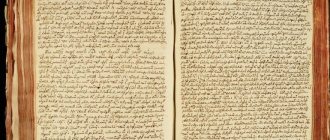Psalm 47 is a song of rejoicing, which is generally believed to have been written in connection with the victory of Jehoshaphat, one of the kings of Judah. For him, David was an example and model for ruling his people and life. Many consider King David to be the author of this psalm; others agree that the children of Korah, a wealthy Levite and cousin of Moses, are related to its writing.
Korah, who rebelled against Moses and apostatized from the faith, did not find support among his disciples and even children. The “Children of Korah” dedicated themselves to the Lord and became temple musicians who sang psalms in church, glorifying the works of the Lord.
Text of Psalm 47
According to the canon, Psalm 47 is sung in Church Slavonic, which not all Christians understand well. And yet, it is not difficult to understand this version of the text; it is enough to use the prayer with emphasis, study it, relying on the works of the Holy Fathers.
With accents in Church Slavonic
In Russian
For those who find it difficult to read Old Church Slavonic, it is recommended to take the translation of the song. This is usually used for private communication with the Lord, that is, at home. In this form, prayer allows the righteous to approach its understanding as much as possible.
Text of prayer Psalm 47
In Church Slavonic with accents
In churches it is customary to read in Old Church Slavonic or Church Slavonic. During the service the words of the song are heard:
1 Psalm, songs of the sons of Korah, second Sabbaths,
2 Great is the Lord and greatly praised in the city of our God, in the mountain of His holy ones.
3 With noble joy of the whole earth: the mountains of Zion, the ribs of the north, the city of the Great King.
4 We know God in his troubles, when he intervenes.
5 For behold, the king of the earth has gathered together and descended together.
6 When Ti saw this, she was surprised, confused, and moved.
7 I receive trembling: there are diseases like those that give birth.
8 With a stormy spirit you will destroy the ships of Tarshia.
9 As we heard and saw in the city of the Lord of hosts, in the city of our God, God is the foundation and forever
10 We accept, O God, Your mercy in the midst of Your people.
11 Because of Your name, O God, Your praise is to the ends of the earth; Your right hand will fulfill righteousness.
12 Let Mount Zion rejoice, and let the daughters of Judah rejoice for your sake, O Lord.
13 Go through Zion and embrace it, lead it among its pillars.
14 Set your hearts on His strength and divide His houses, as the story is told in another generation.
15 For He is our God forever and ever, He will save us forever.
In Russian
However, not everyone speaks Old Church Slavonic, so part of the song may remain incomprehensible. To get as close as possible to its understanding, it is worth reading Psalm 47 in Russian when turning to God in private (at home).
1 Psalm-song of the sons of Korah. On the second day of the week.
2 Great is the Lord and highly praised in the city of our God, in His holy mountain.
3 beautifully established, the joy of the whole earth! The mountains of Zion, the northern slopes, are the city of the great King.
4 God is known in his dwellings as an intercessor:
5 For behold, the kings came together and all passed by;
6 They saw and were amazed, they were embarrassed and fled;
7 Fear and pain seized them there, like women in childbirth;
8 With the east wind you destroyed the ships of Tarsh.
9 As we have heard, so we have seen in the city of the Lord of hosts, in the city of our God: God will establish it forever.
10 We have meditated, O God, on Your goodness in the midst of Your temple.
11 As is Your name, O God, so is Your praise to the ends of the earth; Your right hand is full of righteousness.
12 Let Mount Zion rejoice, [and] let the daughters of Judah rejoice because of Thy judgments, [Lord].
13 Go round about Zion, and compass it, and number its towers;
14 Turn your heart to its fortifications, consider its houses, so that you can tell it to the generation that is to come,
15 For this God is our God for ever and ever: He will be our guide unto death.
History of writing
Many experts believe that Psalm 47 relates to the defeat of Sennacherib, the Assyrian king, who imposed tribute on Hezekiah, the ruler of Judah. The latter, by the way, was a representative of the dynasty of the house of the prophet David. Sennacherib, together with his military leaders, sought the complete subjugation of Jerusalem; they were confident that the king of the Jewish people would hand over the state to them. During the confrontation with him, they did not hesitate to blaspheme God.
Hezekiah began to prepare for the defense of his homeland, asking God for protection. The angels themselves sent the answer to his prayers. Help from above was not long in coming; with it, brave warriors dealt with thousands of invaders. The enemies of Jerusalem found their death under its walls.
The people rejoiced after the victory, the long-awaited liberation from the oppression of the Assyrians. Rejoicing, he did not forget that all this became possible only thanks to the power and mercy of the Almighty. This theme became the main one in Psalm 47.
Explanatory Bible Commentary on the Psalter
How great is the Lord in His royal city, of which He is the Protector (2–4)! The enemies gathered, but died, just as the Tarsian ships died (5–8). We ourselves saw one of the miracles that we heard about from our ancestors; we are filled with reverence for You (9-11). Let all the cities of Judah rejoice. Let them look around Jerusalem, saved by God from enemies and undamaged. This is our God forever and ever (12-15).
Ps.47:3. Beautiful height, the joy of all the earth, Mount Zion; on the north side of it
city of the great King.
Mount Zion is a beautiful hill, because on its northern side is the city of the great King, that is, the city of Jerusalem, where the temple is located, and in it is the Lord himself.
Ps.47:4. God is known in his dwellings as an intercessor:
All the dwellings of this city are under the protection of the Lord and in them (the dwellings) they know that He is their Protector.
Ps.47:8. with the east wind you destroyed the Farsi ships.
After the death of the pagan peoples, which the writer spoke about earlier, he also points to the death of the ships of his king as a matter of great protection and favor of God. In this fact the writer sees punishment for the alliance of his king with the wicked Ahaziah. This alliance and enterprise, if successful, could bring the kings closer to each other. Since Ahaziah was a wicked king, this rapprochement could threaten the spread of wickedness among the Jewish people. The death of ships, therefore, is a sign of trust. The Lord's concern for His people is an expression of His great warning love and mercy, which deserves to be sung.
Ps.47:9. As we have heard, so we have seen in the city of the Lord of hosts, in the city of our God: God will establish it forever.
The miracles that the Lord performed in the past history of the Jewish people and about which oral stories were preserved, were repeated now. This miracle is the deliverance of the city from the attacks of numerous and formidable enemies.
Ps.47:11. As is Your name, O God, so is Your praise to the ends of the earth; Your right hand is full of righteousness.
“Your right hand is full of righteousness” - You dealt with your enemies as they deserved.
Ps.47:12. Let Mount Zion rejoice, [and] let the daughters of Judah rejoice because of Thy judgments, [Lord].
“Daughters of Judah” – cities of Judea. - “For the sake of Your judgments” - for the sake of those definitions that You pronounced over our enemies.
Ps.47:13. Go around Zion and go around it, number its towers;
Ps.47:14. turn your heart to its fortifications, consider its houses, so that you can tell it to the generation that is to come,
The writer enthusiastically draws the attention of his contemporaries to the integrity of the fortifications and towers of Jerusalem. This fact is significant. Make sure by personal inspection that the huge hordes of enemies did not cause any harm to Jerusalem. God did not allow anything to harm them.
Interpretation
The meaning of Psalm 47 is revealed to those who carefully study the interpretation of individual verses of the work:
- Verse 1: The song begins by identifying its performers, the children of Korah. The author describes the sorrows that he had to face due to the machinations of the enemy. He talks about the betrayals of loved ones who turned against him. In such conditions, he nevertheless does not deviate from his chosen faith, although the majority does not want to recognize it. People turned away from the Lord, which means they stopped believing that their ruler was chosen by Him to reign. But even then the ruler trusted in God and sought His protection.
- Verses 2 to 8: Jerusalem is described in detail, its splendor, admiring it, one cannot help but glorify the Lord, since this city was chosen by Him. Jerusalem here is called the place of God's grace, His glory. It is also referred to as “sacred,” “intended for the service of the Almighty.” This city is protected by the One Creator, which is known to everyone. In a life full of sin, he will always be a stronghold of faith, purity and justice.
- Verses 9 to 15: The emphasis is on instruction to the people of Israel, on teaching from God. You must rely on it for your own good in any situation, especially in moments of battle with the enemy, in times of his defeat, which is a manifestation of the Lord’s mercy. Here the author returns to rejoicing at the power of the Almighty, to the realization that His power will be established forever. The psalmist emphasizes that relying on God’s protection is not enough; one must be confident in his goodness, which extends to all nations. At the end of the work it is stated that the One Creator will accept anyone who recognizes him as their salvation, and such will be granted His protection.
Psalm 47 – listen and read the text. Interpretation.
Old Testament
Psalter
- Book of Genesis
- Book of Exodus
- Book of Leviticus
- Book of Numbers
- Book of Deuteronomy
- Book of Joshua
- Judges
- Book of Ruth
- 1st Book of Samuel
- 2 Samuel
- 1st Book of Kings
- 2nd Book of Kings
- 1 Chronicles
- 2 Chronicles
- Book of Ezra
- Book of Nehemiah
- Book of Esther
- Book of Job
- Psalter
- Book of Proverbs of Solomon
- Book of Ecclesiastes
- Book of Song of Songs
- Book of the Prophet Isaiah
- Book of the Prophet Jeremiah
- Book of Lamentations
- Book of the Prophet Ezekiel
- Book of the Prophet Daniel
- Book of the Prophet Hosea
- Book of the Prophet Joel
- Book of the Prophet Amos
- Book of the Prophet Obadiah
- Book of the Prophet Jonah
- Book of the Prophet Micah
- Book of the Prophet Nahum
- Book of the Prophet Habakkuk
- Book of the Prophet Zephaniah
- Book of the Prophet Haggai
- Book of the Prophet Zechariah
- Book of the Prophet Malachi
Sorry, your browser does not support viewing this video.
You can try downloading this video and then watch it. Here you can listen and read the text of Psalm 47
Interpretation of Psalm 47
This is a song about the holy Mount Zion and about the city of God located on it, the city of the great King; about how God, who loves Jerusalem, saved it from its enemies. For this the psalmist praises Him.
Verse 1 corresponds to an inscription indicating the authorship of the sons of Korah or their performance of this psalm.
A. Great is the Lord... in the city (47:2-4)
Ps. 47:2-4
. Zion is called a “beautiful hill” for the reason that on its northern side the city of the great King, the city of God, Jerusalem, was erected. The inhabitants of Jerusalem know (“know” - verse 4) that God Himself dwells with them - in the role of their protector, intercessor.
B. The security of Zion is from the Lord (47:5-9)
Ps. 47:5-8
. The psalmist describes the great defeat suffered by the enemies of Zion. The pagan kings gathered to fight against him, but at the sight of him, fear and confusion took possession of them, and they fled; in verse 7, their fear and pain are equal to that of women giving birth. The defeat of the armies hostile to Zion is compared in verse 8 with the “breaking” by the Lord, by the power of the east wind, of the Persian ships (perhaps referring to the episode described in the final verses of 1 Kings; interpretation on 1 Kings 22:48-50). “Pharsi ships” are believed to have been the name given to large merchant ships that plied the Mediterranean Sea in ancient times. In general, Ps. 47 is dedicated, according to many theologians, to the miraculous deliverance of Jerusalem from the invasions of the Assyrian armies (compare Isa. 10:8; 33:3,14).
Ps. 47:9
. This deliverance, which they witnessed (we saw), the psalmist compares to the wonderful works that the Lord did for His people in the past (As we have heard. Jehovah is often called the Lord of hosts in connection with a description or mention, for it is He who leads in battles like the armies of the earth , so with the armies of heaven. God will establish His city Jerusalem forever, declares the psalmist.
C. The joy of Zion in the Lord (47:10-15)
Ps. 47:10-15
. Having given praise to the Lord (verses 10-11), the psalmist calls on all the inhabitants of Mount Zion and all the cities and villages (here - daughters) of Judah to rejoice and rejoice in the justice of the judgments (here - in the meaning of the decisions and actions resulting from them) of God, for on the basis of these The Lord did not allow Jerusalem to suffer judgments. The psalmist offers to survey and “consider” its towers, fortifications and houses that remain intact, in order to then instill hope in future generations: God, who defended Jerusalem, is and will always be the leader of those who trust in Him.
You can learn more about God and the Bible on the website The Bible about God
Links[edit]
- ↑
Parallel Latin/English Psalter/Psalmus 46 (47) Archived May 7, 2022 at the Wayback Machine Medievalist.net - ^ abc Cooper, Professor Alan (2017). "The Shofar Psalm: Its Use in the Liturgy and Its Meaning in the Bible". thetorah.com
. Retrieved August 12, 2022. - Limburg, James (2000). Psalms. Westminster Press by John Knox. item 156. ISBN. 0664255574.
- "Commentary on Psalm 47", Explaining the Book
- Henry, Matthew. "Psalm 47". Bible Study Tools
. Retrieved August 17, 2022. - ^ abc Duerr, Alfred; Jones, Richard D.P. (2006). The Cantatas of J. S. Bach: with their libretto in a German-English parallel text. Oxford University Press. pp. 331–334. ISBN 978-0-19-929776-4.
- ^ ab Nulman, Macy (1996). Encyclopedia of Jewish Prayer: Ashkenazi and Sephardic Rites (Reprint). Jason Aronson. item 209. ISBN. 1461631246.
- Shurpin, Yehuda (2018). “Why do we blow the shofar at the end of Neilah after Yom Kippur?” . Chabad.org
. Retrieved August 13, 2022. - Nulman (1996), p. 308.
- Jump up
↑ Brauner, Reuven (2013). "Shimush Pesukim: A Comprehensive Index to the Liturgical and Ceremonial Uses of Biblical Verses and Passages" (PDF) (2nd ed.). paragraph 38. - ↑
Roman Missal: Lectionary, Volume 1 - Right Season, Sunday in Ordinary Time: Readings for
the Ascension of the Lord
, London, Geoffrey Chapman, 1981, pp. 550, 553, 557 - ↑
Psalms 47–49. Anglican Church - Psaume XLVII, Op.38 (Schmitt, Florent): results at the international music Score Library Project
- "Oh Clap Your Hands (Orlando Gibbons)". CPDL
. Retrieved June 4, 2022. - ↑
O Clap Your Hands (Vaughan Williams, Ralph): results at the International Music Score Library Project - ↑
Clap your hands, John Rutter - Psalm 47 for the Ascension giamusic.com
- ^ abc Hymns to Psalm 47. gymnary.org. Retrieved August 20, 2018.
- GL 556 Volker Aller Land, Gotteslob, 1975
References
- Parallel Latin/English Psalter/Psalm 46 (47) Archived May 7, 2022 Wayback Machine Mediumist.net
- ^ a b c
Cooper, Professor Alan (2017).
"The Shofar Psalm: Its Use in the Liturgy and Its Meaning in the Bible." thetorah.com
. Retrieved August 12, 2022. - Limburg, James (2000). Psalms
. Westminster Press by John Knox. paragraph 156. ISBN 0664255574. - "Commentary on Psalm 47", Explaining the Book
- Henry, Matthew. "Psalm 47". Bible Study Tools
. Retrieved August 17, 2022. - ^ a b c
Duerr, Alfred;
Jones, Richard D. P. (2006). Cantatas by J. S. Bach: with libretto in German-English parallel text
. Oxford University Press. pp. 331–334. ISBN 978-0-19-929776-4. - ^ a b
Nulman, Macy (1996).
Encyclopedia of Jewish Prayer: Ashkenazi and Sephardic Rites
(Reprint ed.). Jason Aronson. paragraph 209. ISBN 1461631246. - Shurpin, Yehuda (2018). “Why do we blow the shofar at the end of Neilah after Yom Kippur?” Chabad.org
. Retrieved August 13, 2022. - Nulman (1996), p. 308.
- Brauner, Reuven (2013). "Shimush Pesukim: A Complete Index to the Liturgical and Ceremonial Uses of Biblical Verses and Passages" (PDF) (2nd ed.). paragraph 38.
- Roman Missal: Lectionary, Volume 1 - Rule of the Seasons, Sundays in Ordinary Time: Literature for the Ascension of the Lord
, London, Geoffrey Chapman, 1981, pp. 550, 553, 557 - Psalm 47–49. Anglican Church
- Psalm XLVII, Op.38 (Schmitt, Florent): Points for the International Music Library Project
- "Clap Your Hands (Orlando Gibbons)." CPDL
. Retrieved June 4, 2022. - Oh Clap Your Hands (Vaughan Williams, Ralph): Points for the International Music Library Project
- Oh clap your hands John Rutter
- Psalm 47 for the Ascension giamusic.com
- ^ a b c Hymns to Psalm 47
. gymnary.org. Retrieved August 20, 2022. - GL 556 Völker Aller Land, Gotteslob, 1975
Themes
Psalm 47 includes references to Rosh Hashanah, the Day of Judgment in Judaism. Verse 6, which quotes the shofar that is heard on Rosh Hashanah, further hints at God ascending to his thrones of judgment and mercy, themes that echo the day of judgment.[7] The connection is explained in the Midrash:
Yehuda bar Nachmani began in the name of Shimon ben Lakish: “Elohim ascends in the midst of a cry, YHWH, at the sound of the shofar” (Psalm 47:6). When the Holy One ascends to sit on the throne of judgment, it is to dispense strict justice, as it is said, “Elohim ascends amidst shouting.” When Jews take their shofars and blow them, immediately “YHWH to the sound of the shofar.” What does a Saint do? He rises from the throne of judgment, sits on the throne of mercy, is filled with mercy towards them and turns the attribute of strict justice into an attribute of mercy for their sake. When? On Rosh Hashanah (Leviticus Rabbah 29:3).[2]
The same verse 6 also speaks of the sound of the shofar at the end of Yom Kippur, when the Divine presence that rested upon the Jewish people during the day of atonement returns to heaven. This verse can be translated: "God ascends with Teruah", Teruah
reference to the sound of the shofar.[8]
Background
In Jewish tradition, Psalm 47 is one of 12 psalms attributed to the sons of Korah. It is also classified as part of the "Eloitical Psalter" (Psalms 42-83), which includes psalms that speak of God as Elohim rather than YHWH. Psalm 47 is also grouped with other psalms that proclaim God's kingdom as stated in verse 7.[2]
In Christian Science, Psalm 47 is one of seven "enthronement psalms" that refer to the crowning of God as king on the feast.[3] It has also been suggested that the theme of Psalm 47 is “universal joy in the universal reign of God.”[4]
According to Christian scholars, verse 6 (verse 5 in the KJV), "God rose up with a shout," indicates that the psalm was written when King David brought the Ark of the Covenant to Mount Zion. On the other hand, it is an allusion to the Ascension of Jesus to the heavenly Zion after completing his mission on earth.[5][6]
Music settings
The psalm and selected verses were often set to music, emphasizing the call to clap and sing, and referring to the line “God ascends with a shout,” which was associated with the Ascension of Jesus. Heinrich Schütz set the psalm in German together with text from Becker's Psalter, Frohlockt mit Freud, ihr Völker all
, for the choir as his SWV 144. Marc-Antoine Charpentier set in 1683 - 85 pieces.
“Omnes gentes plaudite manibus”
H.192, for 3 voices, 2 high instruments and continuo.
Johann Sebastian Bach began the cantata for the Ascension with three verses from the psalm, Gott fähret auf mit Jauchzen
, BWV 43, first performed in 1726. [6] Carl Martin Reinthaler set the complete psalm in German for choir,
Frohlocket mit Händen, alle Völker
.
In 1904, Florent Schmitt composed a setting for solo soprano, chorus, organ and orchestra, entitled Canine XLVII
.[13]
Orlando Gibbons (1583-1625) set the psalm in English for choir.[14] Ralph Vaughan Williams set the psalm in English in 1920 as O clap your hands
, and a motet for choir and orchestra.[15]
John Rutter set poems 1 to 7, O Clap Your Hands
, for chorus and organ or orchestra in 1973.[16]Oscar Gottlieb Blarr composed a setting for soprano, tenor, chorus (improvised), trumpet, trombone, percussion in 1998 (steel drums), violin, harp and double bass.
Rory Cooney's set of Psalm 47 for the Ascension
, subtitled
God Sits on His Throne
in 2003 - part soloist, three-part choir, ensemble and wind instruments. It can also be performed in a shortened version to the accompaniment of a guitar.[17]
Many hymns are modeled after Psalm 47.[18] They include English The Universal Sovereignty of Christ
from the beginning "Rejoice, O People, Pay Your Homage", published in 1902,[18] and the German "Völker Aller Land", written by Georg Thurmayr in 1964 and edited in 1971, when it was selected for inclusion in the German Catholic collection hymns.
Gotteslob
1975.[19] More hymns pick up themes from Psalm 47, including “Praise be to the Lord Almighty,” which paraphrases verses 6–9.[18]
Psalm 47 Mount Zion
This Psalm tells us about the Founder of Monotheism. Let's give credit to this Master Author. (In Rus', before the Romanov Tsars, no one doubted that the Author of many Psalms (and the hero of some of them: Ps. 2, Ps. 21, Ps. 47, Ps. 86, etc.) is our Savior, a very real person , a poet and musician, and a scientist at that, an astronomer endowed with remarkable mathematical abilities. In Rus' before the Romanovs there was no word “Christ” (“Sunny” in Greek). There was only “Light of Truth”, “Sun of Truth” and the like names This Psalm was written not by the “Sunny One” himself (Ekhn-Aten, in Egyptian), but about him.
# This translation of the Psalm is officially approved by the Russian Orthodox Church (in writing). He was also approved by Gl. Rabbi and Chief Mufti of Moscow.
FOR MORE details about the Psalms, see the television film about Andrei Luchnik’s translations “In the beginning was the word.” The film was shown on January 12, 2000 on Channel 1 (“ORT”, at that time) program Civilization (TV presenter Lev Nikolaev). This is a film about the first edition of the book and about the music. Subsequently, translations of almost all of the Psalms were published (2008). The film is published in an abridged version. https://www.youtube.com/watch?v=Txh-wwPiV6s (Google search)
(Semantic cumulative translation into Russian from Phoenician, Aramaic, Ancient Egyptian, Greek, Hebrew and other languages. [Based on the results of archaeological finds of the 20th century, which well complement and expand the understanding of the meanings of ancient texts, previously known only as “translations from translations”]) .
2 The Lord is glorified on Mount Zion*, 2,3 To the north of the city of the Great King**. 4 From the heights of the most blessed Throne 4 The happy land is guarded.
5 The pagans did not dare to settle here - 6 When they saw the city, they were afraid. 7 Amazement and awe took them - 8 They moved back in awe.
9 All that we learned from the prophets, 9 appeared to our eyes as a holy city: 10 We enter the temple in deep thought, 11 Where You are as glorious as many years ago.
12 Let us rejoice on Mount Zion*, 12:15 Let us give thanks to the Lord’s mercy. 13.14 Count the towers, walls, bastions - 15 After all, these are all given by Him.***
* Mount Zion (Zion, Tsiphon, Tsapanu) - the main peak in the surrounding area (north) of Ugarit (Biblical Jerusalem) - 1770 m above sea level. The word "Ziphon" in Ugaritic (Phoenician) means "north". In addition, the city itself was often called “the daughter of Zion” or simply “Zion,” and not just Mount Zion. Most often, the inhabitants of this city called it “Ur” (or Ur-Salim). Hence the terrible confusion with the city of Ur in Mesopotamia. (Ur simply means “city”). Many biblical stories look much more realistic in this context. (but only after excavations of the 20th century). The city of Ur-Salim (formerly the mound of Ras Shamra) is located in the north of modern Syria, near the modern village of Minet el-Beida (White Harbor). Very nearby, under the water, is a well-preserved city discovered by Jacques Cousteau (“Atlantis”).
** THE GREAT KING is Pharaoh Akhenaten, who spent his youth in Ugarit. They brought there a wounded young man with cut veins on both legs at the level of the middle of the femur. The young man survived, but the compensatory growth of connective tissue on the thighs is visible in all his statues, both grotesque and realistic. The “ritual sacrifice” that Akhenaten underwent was performed by the local Arabian tribe “sa-gaz” (“vein cutters”), which decided to rid Akhenaten’s father of the heir to the throne. However, the young man, thrown out to die in the desert, was miraculously found by friends of Akhenaten’s mother and brought to Ugarit, i.e. to a safe place, which was securely in the possession of the northerners. Akhenaten later returned to Egypt, along with his young wife (Nefertiti) and was enthroned at a very young age (in 848 AD - this is the appearance of the Star of Bethlehem" (Halley's Comet). For 12 years he co-ruled with his father For the last 5-6 years he ruled Egypt single-handedly. In the 18th year of his reign (of which 5-6 years independently), he was subjected to brutal reprisals (“crucifixion”), during which his right eye was gouged out and his right hand was cut off (so that he could not hold the scepter is a symbol of royal power). However, this time too, the pharaoh miraculously survived. On the third day after the massacre, his disciples noticed the movements of the body wrapped in a linen shroud, and heard human groans. (The pharaoh’s body was given to them “as unnecessary.”) A detailed chronology of events by day is recorded in the Egyptian calendar, but you can find out briefly here: https://www.stihi.ru/2016/05/18/4688 After which the wounded pharaoh was taken to his mother’s estate, where he lived for several more Akhenaten (which means “sunny in Egyptian) is the author of almost all of the fundamental “Psalms of David”, with the exception of a few, which include this psalm.
*** For the leitmotif of the city given from above, see also Ps. 17, 43, 50, 101, 103 (Second Coming). This theme arose as a result of the repeated destruction of the city by earthquakes, tsunamis, volcanic eruptions of the Santorini volcano and the subsequent revival of the city by returning residents. Many consider it the capital of the kingdom of Mitanni (Canaan = “Khanate”).
****About the frequent confusion of the words Zion and Sinai (without vowels) - later.
Uses
Judaism
Psalm 47 is read seven times before the shofar blows on Rosh Hashanah. These seven repetitions correspond to the seven references to Elohim (God) in this psalm,[2[2] also referencing the seven heavens that God created.[7[7]p>
Verse 6 is one of ten verses included in the group known as Shofrot
(verses associated with blowing the shofar) recited during the Mussaf prayer on both days of Rosh Hashanah.[9[9]p>
According to Siddur Avodas Yisrael
, Psalm 47 is read as the Song of the Day on the second day of Rosh Hashanah.[1[10]p>
Christianity
Because the line “God ascends with a shout” was associated with the Ascension of Jesus, the psalm is used in liturgies for the holiday.[6[6][11]p>
Anglican Church
In the Church of England, Psalm 47 is part of the Evening Prayer on Day 9, along with Psalm 48 and Psalm 49.[1[12]p>
